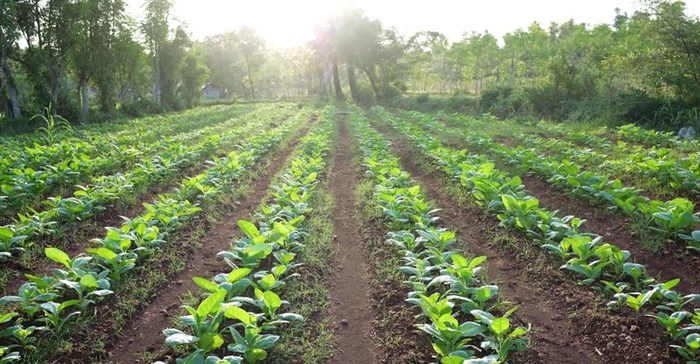Is food security and tobacco growing incompatible in Africa?

Hunger and poverty are directly and closely correlated and any threat to food security has a direct knock-on effect on the region achieving the United Nations Sustainable Development Goals. SADC has acknowledged the looming crisis in its 'Declaration on Agriculture and Food Security'.
One constructive international response to the threat is the G8’s New Alliance for Food Security in Africa. The objective of the Alliance is to encourage re-investment in agriculture in order to allow low-income food deficit countries to improve agricultural productivity and thus reduce their dependency on food imports and food aid.
Confronted by the ravages of climate change and global food crop price fluctuations, what is the correct balance between food crop and cash crop production in sub-Saharan Africa? Some contend that cash crop production discourages food crop production and intensifies human insecurity, yet the tobacco sector may point to a new and better way. While recognising the high cash value of tobacco, which is seven times more profitable than maize and fourteen times more profitable than cotton per hectare, tobacco production in Sub-Saharan Africa is increasingly conducted as part of a balanced, holistic and integrated agricultural production system.
Tobacco takes the GAP
Food security is dependent on a raft of factors, not least of which is Good Agricultural Practices (GAP). Good Agricultural Practices are a series of codes, standards, and regulations that seek to achieve four key objectives: ensure safety and quality in the agricultural produce chain, capture new markets by modifying supply chain governance, improve natural resource use, worker’s health and working conditions, and to create new markets and opportunities particularly for farmers in developing countries.
Defined by the United Nations Food and Agriculture Organisation as those objectives that “address environmental, economic and social sustainability for on-farm processes and result in safe and quality food and non-food agricultural products”, tobacco companies subscribe fully to GAP objectives and go far beyond the minimum required for mere compliance. While GAP should be fully aligned with national government’s own agriculture, sustainability and development programmes, there are, however, economic and material costs to compliance. In this regard, the FAO warns that small-scale farmers may not be able to seize export opportunities unless they are adequately informed, technically prepared and organised to take advantage of compliance certification opportunities.
Guided by the principles of GAP as well as responsible Agriculture Labour Practices, the Integrated Production System (IPS) of tobacco meets and surpasses these FAO guidelines and allows small-scale farmers to seize the opportunities outlined by the FAO. Indeed, IPS tobacco farmers don’t need to ‘mind the GAP’, they now ‘take the GAP’.
Tobacco farmers are more food secure farmers
IPS provides for holistic support to the farmer, which includes dedicated agronomist support, as well as the provision of seeds, fertilizer, and cash loans. Little surprise then that IPS farmers are growing tobacco at a better quality, greater yield and securing a higher price than through traditional methods. With a guaranteed volume of tobacco being purchased from the farmer at prices higher than the national average, IPS farmers are better placed to utilise the cash generated from tobacco to further diversify their agricultural production. Consequently, IPS tobacco farmers are more food secure farmers. More food secure farmers are critical to stabilising and sustaining rural areas, which, for most African countries, is the backbone of the economy.
It may come as a surprise to learn that as part of tobacco companies’ Integrated Production System, tobacco farmers are encouraged and supported to grow food crops such as maize and soya beans as part of a sustainable and responsible growing and procurement system. Access to technical training and support and the availability of fertilizers, pesticides, and improved seed are critical for food security - in some countries and/or regions, it is only smallholder farmers contracted with tobacco companies that have such access and support.
A benchmark is for contracted IPS farmers to grow food crops at least in equal weight to tobacco. In some Sub-Saharan African countries, IPS farmers are now growing more food crop than tobacco by weight. Perhaps even more surprising is the productivity of tobacco farmers growing food crops. IPS tobacco farmers in Sub-Saharan African countries are growing food crops at a yield 50% to 300% higher than the national average. Up to 60% of IPS tobacco farmers' maize production feeds into the national market, thereby contributing directly to national food security. Due to their productivity under IPS, tobacco farmers, are now net contributors to the food crop supply chain in southern Africa.
Notably, the efficiencies gained from the IPS system provide for more time and labour to be spent on the production of food crops. The IPS system ensures that small-scale farmer production is balanced, sustainable and GAP compliant.
Best practices
There is much that can be learnt from the tobacco IPS system, not merely concerning better tobacco yields, but more fundamentally, about how to implement Good Agricultural Practices, sustainable environmental and labour practices and most importantly for millions across Southern Africa, food security. While the main tobacco growing countries within SADC are already in discussions to coordinate and share sustainability best practices, this knowledge and experience can be shared and tapped into for the benefit of the entire continent of Africa.
Progress, true progress, is not a zero-sum equation, rather it is defined as a positive sum outcome, more commonly-known as a ‘win-win’. IPS tobacco production in sub-Saharan Africa is an example of a regional win-win.
Source: African Press Organisation

APO is the sole press release wire in Africa, and the global leader in media relations related to Africa. With headquarters in Dakar, Senegal, APO owns a media database of over 150,000 contacts and the main Africa-related news online community.
Go to: www.bizcommunity.com/PressOffice.aspx?cn=apogroup






















